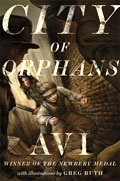 One of the most difficult aspects of writing a novel is establishing the logic of the plot and of the characters. It is rare to speak of logic in this context, but I’m convinced it is a key component. It’s all the more crucial, because the reader does not (consciously) think of narrative in this way. Yet, if the reader cannot follow the logic of cause and effect, of motivation, of an unrolling sequence, you will lose your reader. For the writer composing realistic fiction it is easier to catch a failure of that logic. If writing fantasy, it is too easy to fudge the logic. I recall editor Ruth Katcher telling me that fantasy needs to be written like historical fiction. That is, it must follow consistent facts—even if they are made-up facts. And, once, my late friend Bob Cormier, (I am the Cheese, The Chocolate War) told me, “I allow myself only one coincidence a book.” Yet a recent book of mine, City of Orphans, is predicated on a series of acknowledged coincidences. I think the book works because it is about those coincidences, what my narrator chooses to call “God’s small miracles.” It’s a good exercise to look at a descriptive paragraph—even each sentence!—you have written. Does the sequence of detail, events, emotions, follow upon one another in a logical way? Does it lead—logically—somewhere? It is much more powerful when it does. It may seem exaggerated to suggest that a novel constitutes a long, logical sequence of events but I think, when it is well-written, it does. Think about it. Logically.
One of the most difficult aspects of writing a novel is establishing the logic of the plot and of the characters. It is rare to speak of logic in this context, but I’m convinced it is a key component. It’s all the more crucial, because the reader does not (consciously) think of narrative in this way. Yet, if the reader cannot follow the logic of cause and effect, of motivation, of an unrolling sequence, you will lose your reader. For the writer composing realistic fiction it is easier to catch a failure of that logic. If writing fantasy, it is too easy to fudge the logic. I recall editor Ruth Katcher telling me that fantasy needs to be written like historical fiction. That is, it must follow consistent facts—even if they are made-up facts. And, once, my late friend Bob Cormier, (I am the Cheese, The Chocolate War) told me, “I allow myself only one coincidence a book.” Yet a recent book of mine, City of Orphans, is predicated on a series of acknowledged coincidences. I think the book works because it is about those coincidences, what my narrator chooses to call “God’s small miracles.” It’s a good exercise to look at a descriptive paragraph—even each sentence!—you have written. Does the sequence of detail, events, emotions, follow upon one another in a logical way? Does it lead—logically—somewhere? It is much more powerful when it does. It may seem exaggerated to suggest that a novel constitutes a long, logical sequence of events but I think, when it is well-written, it does. Think about it. Logically.